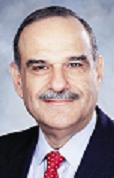Campaigning, and Katrina …
Under “Flaw and Order,” TP editorial writer Stephanie Grace explains, in her view, why it's important to go ahead with the imperfect, but vital, elections.
As New Orleans, and interest groups from outside New Orleans, continue to debate whether the April 22 election should proceed as planned, it's worth remembering that there's no magic number.
Nobody can say just how many of the disproportionately African-American hurricane evacuees still living outside the city's boundaries must participate in order to show that they were given every opportunity to vote.
The federal Voting Rights Act doesn't offer any formula. It says only that voters shouldn't face discriminatory obstacles, and that procedural changes should not "put racial minorities in a position inferior to the one they occupy under the status quo, as compared to non-minorities, vis a vis their ability to elect their candidates of choice," according to a Justice Department letter explaining why it approved the city's post-Katrina access arrangements.
And vastly divergent population projections do little to clarify who intends to return to New Orleans in the long-term, and who therefore would want a say in the city's future leadership.
There's also no magic date, a point in time when those answers will become clear. With so many variables unsettled -- levees, the buyout plans, and certainly when public housing and rental property will once again be widely available -- we may not be able to get a handle on the city's long-term population for months or years.
Are the circumstances of the April 22 vote perfect? Of course not. Could Louisiana lawmakers have made things easier by setting up out-of-state satellite polling sites in places such as Houston and Atlanta, just as they did across the state? Absolutely.
And was there at least some jockeying for relative advantage embedded in that decision? Yeah, probably. These debates, unfortunately, never happen in a political vacuum, and no question's as politically loaded these days as the racial make-up of the electorate. But that doesn't mean that the whole system was set up to disenfranchise two-thirds of New Orleans voters, as the Rev. Jesse Jackson, who seems far more interested in grabbing headlines than in solving problems, has charged.
The point is, the election is set, and the campaign is under way, and the only thing to do right now is make the best of it, and do everything possible to make things easier on the voters who aren't back.
As New Orleans, and interest groups from outside New Orleans, continue to debate whether the April 22 election should proceed as planned, it's worth remembering that there's no magic number.
Nobody can say just how many of the disproportionately African-American hurricane evacuees still living outside the city's boundaries must participate in order to show that they were given every opportunity to vote.
The federal Voting Rights Act doesn't offer any formula. It says only that voters shouldn't face discriminatory obstacles, and that procedural changes should not "put racial minorities in a position inferior to the one they occupy under the status quo, as compared to non-minorities, vis a vis their ability to elect their candidates of choice," according to a Justice Department letter explaining why it approved the city's post-Katrina access arrangements.
And vastly divergent population projections do little to clarify who intends to return to New Orleans in the long-term, and who therefore would want a say in the city's future leadership.
There's also no magic date, a point in time when those answers will become clear. With so many variables unsettled -- levees, the buyout plans, and certainly when public housing and rental property will once again be widely available -- we may not be able to get a handle on the city's long-term population for months or years.
Are the circumstances of the April 22 vote perfect? Of course not. Could Louisiana lawmakers have made things easier by setting up out-of-state satellite polling sites in places such as Houston and Atlanta, just as they did across the state? Absolutely.
And was there at least some jockeying for relative advantage embedded in that decision? Yeah, probably. These debates, unfortunately, never happen in a political vacuum, and no question's as politically loaded these days as the racial make-up of the electorate. But that doesn't mean that the whole system was set up to disenfranchise two-thirds of New Orleans voters, as the Rev. Jesse Jackson, who seems far more interested in grabbing headlines than in solving problems, has charged.
The point is, the election is set, and the campaign is under way, and the only thing to do right now is make the best of it, and do everything possible to make things easier on the voters who aren't back.





0 Comments:
Post a Comment
<< Home